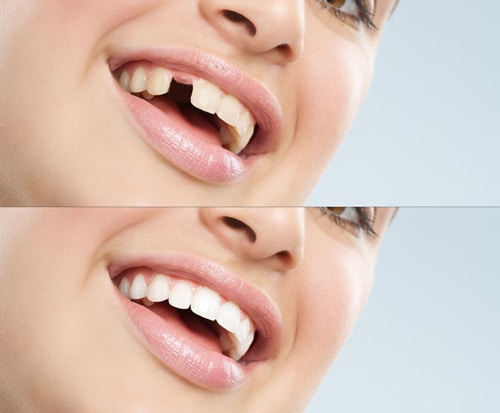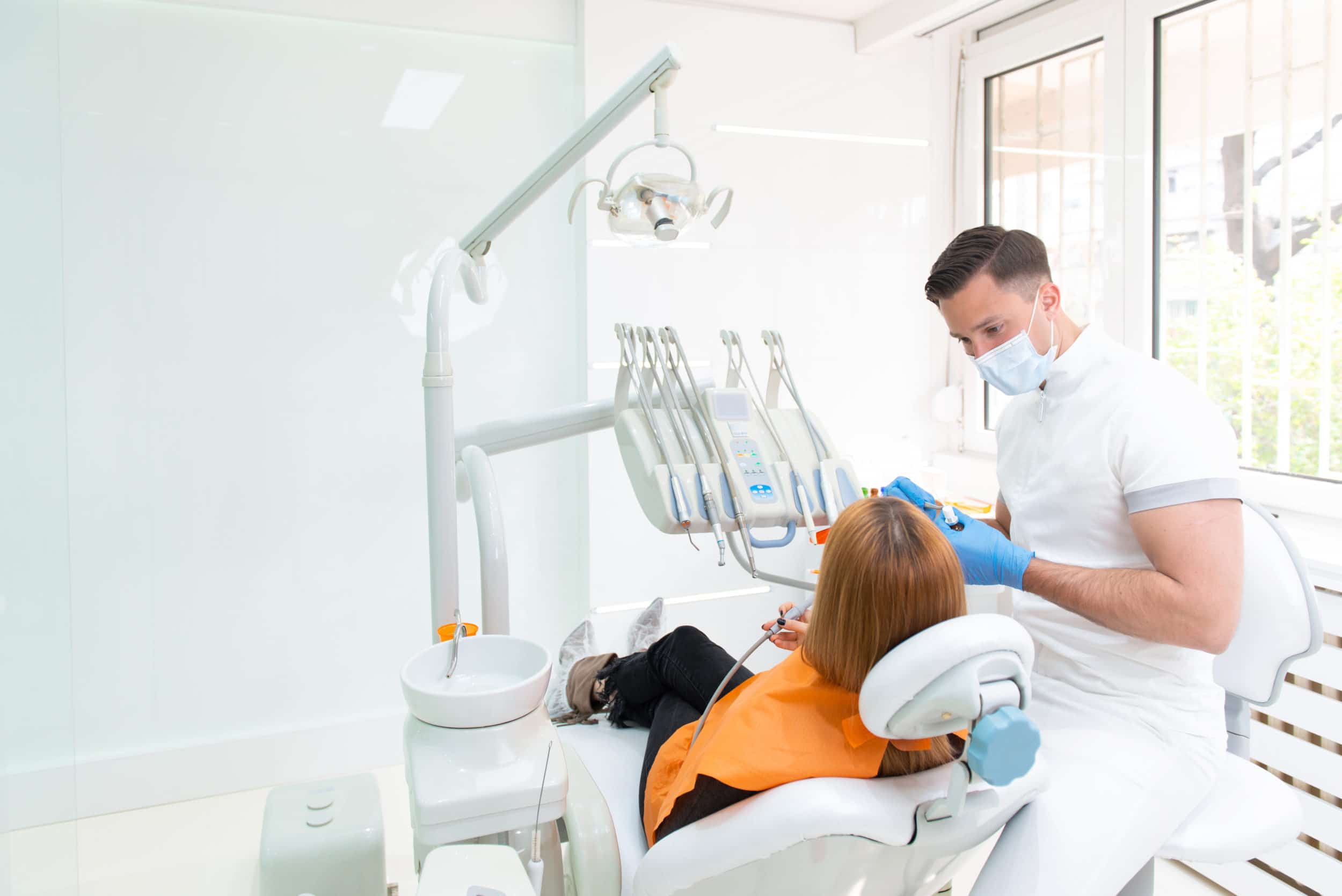Convenient Locations Serving Allston & Brighton, MA
People with failing or missing teeth know the emotional pain that can come from smiling. No one should have to feel embarrassed or self-conscious simply because they are expressing happiness.
While there are various methods and treatments for really problematic teeth, oral implants can be the best solution for many patients.
To learn more about our services or to determine whether you are a candidate for dental implants, give us a call to schedule your consultation with Dr. Nazila Bidabadi. Dial 617.332.8146 for our Newton office or 617.782.9250 for our Brighton office!
What Is a Dental Implant?
A dental implant is a fixture used in tooth-replacement treatment. Unlike a bridge or denture, dental implant treatment restores the complete tooth, including the root. The implant consists of a tiny post, which is inserted into the jawbone. It also has an abutment, which connects the post to the crown, bridge, or denture.
Dental implants bring back the feel and function of real teeth, making them a great solution for tooth loss. Here are the benefits you could experience:
- Work Like Natural Teeth: Implants let you chew, talk, and smile without worrying about discomfort or slipping.
- Keep Your Speech Clear: Unlike dentures, implants stay in place, so you don’t have to deal with slurring or clicking.
- Easy to Care For: Brush and floss just like you do with your regular teeth – no special cleaning routines needed.
- Options for Every Need: Whether it’s one tooth, several, or a full set, implants can cover it with bridges, individual posts, or All-on systems.
- Stabilize Dentures: Implants can keep dentures secure so they don’t shift around or cause irritation.
- Prompt Jawbone Regeneration: A major consequence of tooth loss is your bone structure can degrade over time, changing how you look and making your mouth and jaw look sunken. Dental implants give structure to your jawbone and promote long-term bone density.
Beyond restoring your teeth, implants give you the freedom to enjoy eating, talking, and smiling without hesitation. They give you back your confidence, knowing your smile is strong and beautiful!

What Are Dental Implants Made Of?
Dental implants are screw-like posts that are made of titanium alloy. This material has been used for many years in knee, hip, and shoulder implants. It is known to be highly biocompatible, meaning that the risk of allergy is extremely rare.
Am I a Candidate for Dental Implants?
Most adults missing one or more teeth can be candidates for dental implants. The treatment is highly versatile and works for replacing a single tooth, several teeth, or even a full set.
Ideal candidates typically:
- Have good general health.
- Have healthy gums free from uncontrolled gum disease.
- Have sufficient bone density to support the implant.
- Do not smoke or are willing to quit during the healing process.
For patients with certain conditions such as bone loss, diabetes, or a history of gum disease, dental implants may still be an option. Advances in implant dentistry, including bone grafting, often allow treatment for those who were previously not considered candidates. Bone grafting can also help prevent further bone loss over time.
Are Dental Implants the Best Option for Restoring My Smile?
Dental implants are the next best thing to your real teeth.
Dr. Bidabadi performs a thorough evaluation to ensure implants are right for you. This includes examining your teeth, gums, and jaw and using imaging to assess bone density and sinus structure. She’ll also review your medical history to address any factors that might affect the success of your treatment, such as smoking, heavy alcohol use, or previous radiation therapy to the jaw. These conditions don’t necessarily rule out implants but may require careful planning.
With a high success rate, dental implants can be a dependable solution to restore your smile. Dr. Bidabadi ensures every aspect of your health and oral structure is considered for the best possible results.
What to Expect During the Dental Implant Procedure
Dr. Bidabadi uses a detailed, patient-focused approach to ensure your dental implant treatment is as smooth and effective as possible. The process typically involves several key steps spread out over multiple appointments:
- Evaluation: During your first visit, Dr. Bidabadi conducts a dental exam, including x-rays, to assess your teeth, gums, and jawbone. If necessary, she may collaborate with specialists, such as periodontists, to address any underlying conditions like gum disease or infection before moving forward.
- Preparation: Depending on your individual needs, Dr. Bidabadi may schedule tooth extractions or bone grafting to strengthen the jawbone and make sure it can support the implant.
- Implant Surgery: The implant procedure takes place in the office using local anesthesia. Dr. Bidabadi makes a small incision in the gum to access the jawbone, inserts the implant post, and then repositions the gum tissue to protect the area during healing. The procedure typically takes one to two hours per implant.
- Healing Phase: Over the next few months, the implant integrates with your jawbone through a process called osseointegration, creating a stable foundation for your restoration.
- Abutment Placement: Once the implant has fully healed and stabilized, Dr. Bidabadi reopens the gum to attach an abutment – a small connector that secures the final restoration. This step is minimally invasive and performed under local anesthesia.
- Restoration: The final step involves placing the custom crown, bridge, or denture onto the abutment. This restoration is designed to match your natural teeth, restoring both function and appearance.
How Long Is the Recovery Period?
Recovery from the dental implant procedure is generally short and simple but will depend on the location, number of implants, and aftercare effort.
Initially, recovery focuses on supporting the gums as they heal from the tiny incision. For the first 24 hours after treatment, the gums may be soothed by warm salt-water rinses. After 24 hours, regular, gentle oral care may resume.
It’s common for the gums to feel tender and for the jaw to feel sore after dental implant treatment. You can alleviate these effects with a prescription or over-the-counter medication, taken as directed. Usually, the post-surgical pain resolves in one to two days.
More extensive procedures, such as those that involve multiple implants and bone grafting, may require up to two weeks before resuming normal activities.
Can the Implant & Crown Be Placed at the Same Time?
In some cases, it is possible to place the crown or a temporary restoration immediately after the implant is inserted. Whether this option works for you depends on factors such as the location of the implant, the condition of your jawbone, and your overall oral health.
Dr. Bidabadi will assess your specific situation during your consultation to determine the best approach. While immediate placement can be convenient, some cases may require a healing period to ensure the implant integrates securely with the jawbone before attaching the final crown.
How to Take Care of Your Dental Implants
Proper care is essential to keep your dental implants in great shape for years to come. Here are a few simple tips to maintain your oral health and protect your implants:
- Use a Soft Nylon Toothbrush: These brushes are gentle on implants while still getting the job done. Brush twice daily to reduce the risk of tooth decay, gum disease, or implant damage.
- Choose Gentle Oral Products: Stick to toothpaste and mouthwash for sensitive teeth. Avoid products with strong flavors like mint or cinnamon, which can cause irritation, and opt for gentler ingredients.
- Floss Daily: Use floss designed for dental implants to remove food particles and bacteria that can lead to decay or gum issues.
By incorporating these simple habits into your routine, you’ll protect your implants and keep your smile healthy.
Patient Testimonial
"Goddess Of Dentistry!
Dr Bidabadi is the goddess of dentistry. I have been been going to see her since 1990. She is meticulous, and has the deepest concern for your overall health. She takes the time to sit down and listen to your dental problems. She has the nicest, thorough and knowledgeable hygienists."
Dental Implants vs. Dentures & Bridges

Dental implants stand out by providing the closest experience to natural teeth. Unlike dentures and bridges, implants fuse with the jawbone, promoting bone health and preventing long-term changes to your facial structure. They are stable, long-lasting, and feel like part of your natural smile.
While other options like dentures and bridges can address missing teeth, implants offer unique benefits such as durability, independence from surrounding teeth, and ease of care.
Dr. Bidabadi can guide you in exploring how dental implants compare to other solutions and determine the best fit for your needs.
Meet Dr. Nazila Bidabadi
Dr. Nazila Bidabadi, President and Chief Cosmetic Dentist at Soft Touch Dentistry, is a highly respected leader in cosmetic dentistry. As a clinical instructor at the Harvard School of Dental Medicine for over a decade, she has guided future dentists and evaluated their progress. She has also mentored at Boston University’s School of Dentistry, reflecting her dedication to excellence in her field.
Dr. Bidabadi has a Doctor of Dental Medicine (DMD) from the Henry Goldman Dental School and a Bachelor of Science in Biology from Boston University. Her commitment to precision ensures exceptional care, whether for routine visits or advanced restorative treatments. Patients trust Dr. Bidabadi to give them beautiful, lasting results.
Do Dental Implants Look & Feel Like Real Teeth?
Dental implants feel like real teeth because the implant post becomes encased by the natural bone tissue of the jaw. When you chew, your teeth feel no different than they would if tethered by your natural roots.
Dental implants also look like real teeth because the entire dental implant post is situated beneath your gums. There are no artificial "gums" made of resin or acrylic, just your natural gum tissue surrounding the hidden dental implant. The tooth itself will closely resemble natural enamel in its translucency, shade, gradient, and sheen.
We go over the finer details of appearance during our visit, in which you choose the material to be used in the fabrication of your dental implant crown.
What Type of Anesthesia Will Be Used?
The dental implant procedure is performed using the same local anesthetic that numbs the mouth when you get a filling. The generous use of the anesthetic medication blocks pain signals, keeping you comfortable for the duration of your procedure.
Does Dental Insurance Cover Implants?
At this time, the cost of the dental implant procedure may not qualify for coverage. However, your insurance provider may cover part of the restoration process, such as the crown, bridge, or denture that will replace missing teeth.
For the most up-to-date and detailed coverage information, we suggest that you contact your dental insurance company directly for an outline of your policy.
How Long Is the Dental Implant Procedure?
It may take less than an hour to insert a single dental implant. More complex cases involving multiple implant posts may take a few hours. Your dentist will discuss how long you should expect to be in the office on the day of your procedure.
Are There Any Foods I Should Avoid With Dental Implants?
After receiving dental implant treatment, it’s important to note which foods can cause your oral health more harm than good. To keep your oral health in great condition, try to avoid the following foods and drinks after dental implant surgery:
- Dark-colored drinks such as coffee, cola, tea, and fruit juices can leave stains on your teeth
- Crunchy foods such as chips and popcorn may chip or damage your teeth
- Chewy and sticky foods like gum, jerky, or caramel can increase wear and tear
- Candies, desserts, and snacks high in sugar can increase the risk of tooth decay and cavities
- Acidic foods such as tomatoes and oranges will weaken your tooth enamel
Are Dental Implants Permanent?

Dental implants are designed to last indefinitely. Complications rarely occur. Studies indicate that the average lifespan of a dental implant is at least 25 years. After treatment, implants are influenced by your general health and lifestyle and how well you take care of your teeth and gums.
What Are the Potential Risks of Dental Implants?
Dental implant treatment is similar to any surgical procedure, so it has some risks. These are minor and rarely occur. However, patients should understand that there is a chance of:
- Infection around the implant
- Implant rejection or failure
- Injury to the jaw, blood vessels, or surrounding teeth
- Injury to the sinus cavity from implants placed in the upper jaw
The risks associated with dental implant treatment can be reduced when an experienced dentist performs the procedure, like Dr. Bidabadi. Patients also decrease risks by following pre- and post-op care instructions.
What Happens If I Don’t Replace a Missing Tooth?
If a missing tooth is left untreated, surrounding teeth can shift, causing bite problems and misalignment. Over time, the jawbone in the area may deteriorate due to lack of stimulation. Dental implants help prevent these issues by preserving bone structure and maintaining proper alignment.
How Long Does It Take for Dental Implants to Heal?
Healing typically takes three to six months, depending on the individual and the complexity of the procedure. During this time, osseointegration occurs, where the implant fuses with the jawbone for a strong foundation. Proper care and follow-up appointments ensure the healing process stays on track.
Can Dental Implants Be Used for Younger Patients?

Dental implants are generally recommended for patients whose jawbones have fully matured, typically after their late teens or early 20s. Premature placement can interfere with jaw development, so age and growth are key factors. Dr. Bidabadi evaluates younger patients individually to determine the safest and most effective timing for treatment.
Choose Soft-Touch Dentistry for Your Implant Treatment
If, like many others, you feel implant dentistry could be the choice for you, here’s what we offer at Soft-Touch Dentistry:
A Comprehensive, No-Cost, No Obligation Cosmetic Dentistry Exam. This Exam Normally Costs $180, And Is Totally FREE! The Exam Includes The Following Services:
- A full mouth review of your teeth
- Provide you with an assessment and options.
- Will examine any recent X-rays that you bring in
- The health of your gums will be examined
During the exam, your specific concerns, desires, and considerations will be addressed by your doctor. We can then make the proper recommendations for you so you can decide if implants are right for you.
Schedule a Dental Implant Consultation with Dr. Bidabadi!
Don’t hesitate any longer. You’ve spent enough years with a missing tooth in your smile or a wired partial and in discomfort. Now is the time to regain your smile and enjoy a resurgence of confidence and happiness!
Schedule an appointment today by visiting our contact page. You can also dial 617.782.9250 for our Brighton office or 617.332.8146 for our Newton office. Our practice looks forward to serving you!
